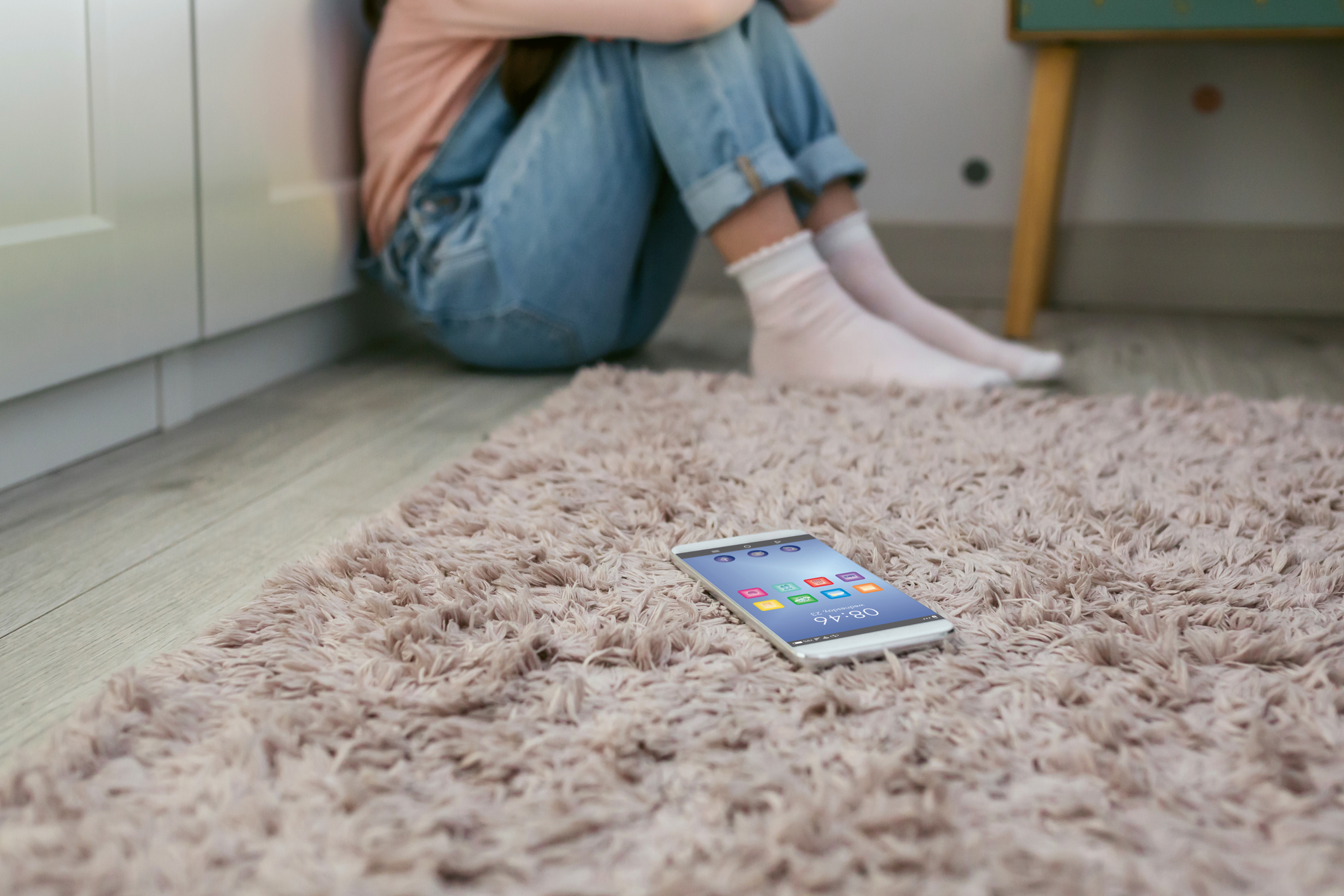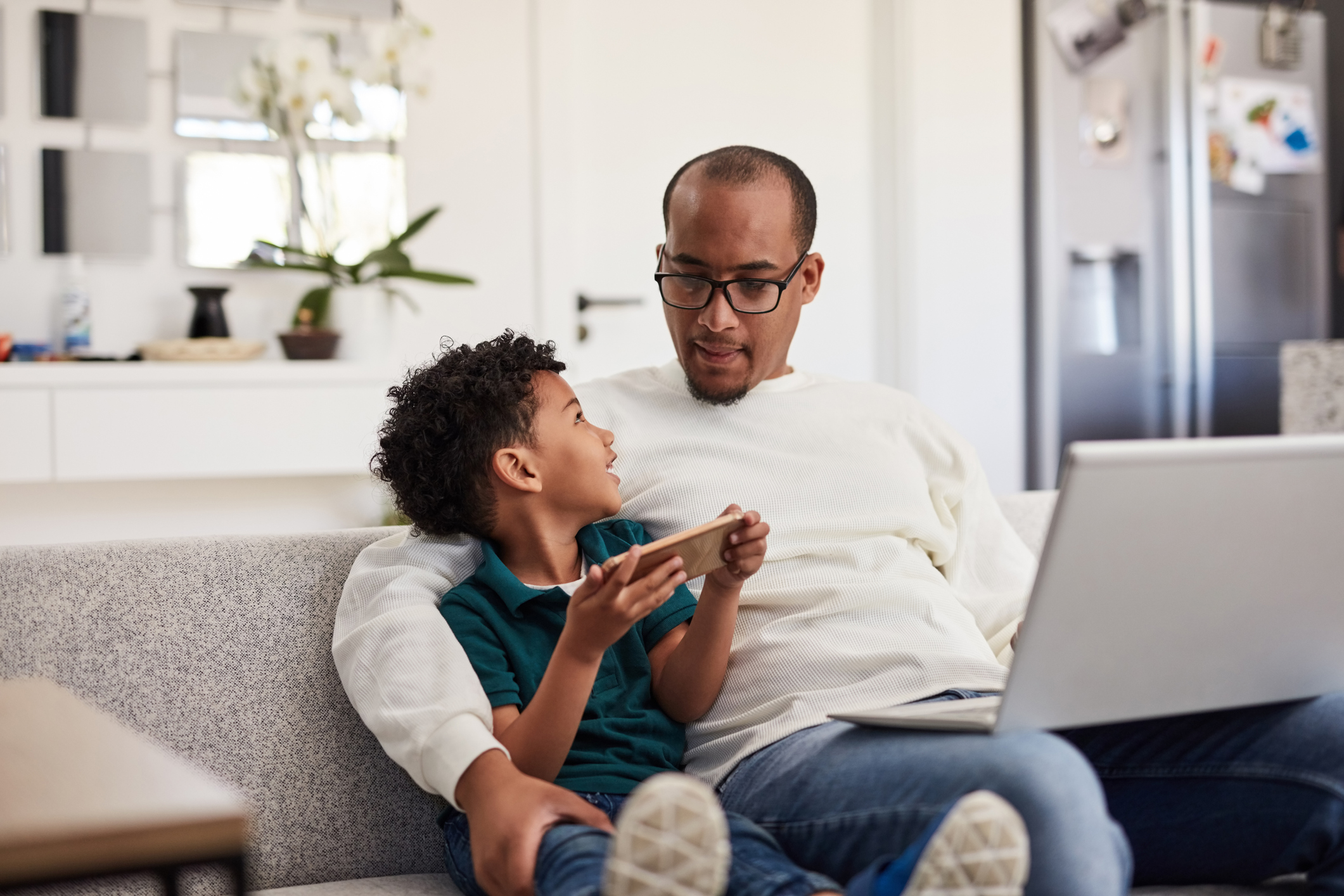Is it ever okay to check your child's phone? We ask three experts who share their honest opinions and advice on the controversial topic
Plus we share 6 expert-led tips to check in on your child's digital life

It's controversial for sure, but are you tempted to check your kid's phone to make sure they're being safe online? We ask three experts for their honest opinions on when you should (and shouldn't) snoop and what to do if you get caught.
It can be tempting to just have a quick sneaky peek at your child's mobile phone messages, especially if your child struggles to take a break from the screen. And, it's understandable as experts agree that too much screen time can affect a child's development and behaviour.
But while checking your child's phone might help you keep kids safe online, it could actually do more harm than good to your relationship if it's not dealt with correctly.
Dr Jennifer Simpson, a Senior Lecturer in Social Work at Nottingham Trent University, with a strong interest in mobile phone use within families. She told us why parents might be tempted to pry to protect their child. "A parent may wish to check their child’s phone for a variety of reasons that include information, photos and messages that have been sent by close friends and family. A parent may check a phone because of a message from the school or homework their child seeks to complete. Often, many parents find themselves checking their child’s phone for less positive reasons that include unsolicited requests, sexual exploitation, cyberbullying, violence and pornography.
"Parents, now more than ever, recognise that their child’s phone means the entire world is available at a swipe. They also have to navigate the evolving content of the Internet and the ever-changing array of social media apps their child is likely to access."
Is it ever OK to check your child's phone?
It may be necessary if you notice concerning changes in their behaviour. According to Dr Jennifer, parents who take an interest in their child's tech use, allow mistakes, and have a trusting relationship are better positioned to check phones without upsetting their child. Parents who have strict, non-negotiable rules may find it harder.
"When a parent has rules and restrictions that are not open to negotiation, particularly as a child matures, they are less likely to have a relationship that allows their child to come to them when a mistake is made." In other words, your attitude toward your child and how you already talk to them about mistakes and rule-breaking could impact how they feel about you checking their phone.
Parenting advice, hot topics, best buys and family finance tips delivered straight to your inbox.

While checking your child's phone can cause tension, it may be necessary if you notice emotional withdrawal, too much time alone, or expensive gifts from strangers. Above all, approach it openly, involve your child, and maintain trust - this will make difficult conversations easier.
Dr Jennifer has more. "Where a parent has concerns because of a change in their child’s behaviours such as going out for long periods with no indication as to when their child will be returning; being overly influenced by friends or receiving expensive gifts from a person not known to them, the above can be legitimate reasons to check a child’s phone.
"Alternatively, a child may demonstrate other behaviours like remaining in their bedrooms for long periods, becoming emotionally withdrawn, or snapping at members of the family, then again, these may be reasons to check a child’s phone."
Mum-of-three, Dianna tells us; "When we agreed to get our 12-year-old a phone we sat down and agreed on some family rules around it. One of those rules was 'spot checks' to keep her safe. She agreed at the time, on paper it sounded easy, but in practice, we had to remind her of the agreement. We reassure her it's not to 'catch her out' but to keep her safe as we can spot red flags she can't just yet."
Dad Lee shares his mistake; "I took a look through our son's phone just to check and came across messages with undertones of bullying that had been shared in a friend group, and then I was stuck on how to tell him as I knew how much I'd damage the trust in our relationship if he knew I'd gone through it without telling him."
Dr Huriye Atilgan, a neuroscientist and founder of Tak Index, says open communication and trust within families is 'vital'. "When it comes to checking your child's phone behind their back, I believe transparency and respect are key.
"For children aged 11 to 13, it's crucial to establish boundaries early on and have open discussions about online safety. It’s best for parents to periodically review their phones, but together with their child to educate and build trust.
"For older teens aged 14 to 17, privacy is more important, but parents should still be vigilant. I recommend encouraging open dialogue and setting guidelines for phone usage."
Psychologist and relationship adviser, Barabra Santini, agrees. "For younger children the digital world is vast and often overwhelming. At this stage, parental guidance is not just helpful; it's necessary. I recommend that parents discuss the use of monitoring apps that allow for oversight without secrecy, promoting a sense of security rather than surveillance.
"For older kids, the stakes are different. Teenagers are forming deeper social connections and a sense of independence. Here, privacy is a crucial part of their developmental process. Instead of covert checks, go for a negotiated openness, where teens know that parents might review their digital activity, but only under agreed-upon circumstances that respect the teen’s growing autonomy."
When is it ever NOT okay to check a child's phone?
As kids mature, they deserve more privacy and independence, and that includes their digital devices. If your child is over 15, checking their phone without permission or explanation could be inappropriate. For younger kids, you may still need to check their devices but it's a good idea to explain your reasons.
Dr Jennifer advises, "The notion of a parent never checking a child’s phone cannot necessarily be achieved, particularly when the phone is not working! However, it is important to recognise that age, maturity, and ability all play a factor in when not to check a child’s phone. Additionally, it is also important to remember that an aspect of maturity is privacy.
Mum Louise says phones for under-18s should be fair game for parents. "My job is to keep my kid safe, simple as that. If they want a phone they need to know that I will be checking, because their brains are not developed enough to cope with all that comes with such open and virile communications - such is life with teens. Kids need boundaries."
What to do if you feel you need to check your child's phone
- Explain your concerns to your child
- Take a genuine interest in their phone use
- Suggest you check the phone together
- Ask for expert help and guidance
Explain your concerns to your child
The appropriate approach to checking your child's phone depends on their age and maturity. Dr Jennifer advises, "The older the child, the more important it is for parents to explain their specific concerns and reasons for wanting to check the phone. Don't make it a 'fishing expedition' - be clear about what you want to look at."
Take a genuine interest in their phone use
For parents who don't have an open relationship where they could comfortably discuss checking the child's phone first, the temptation to take it without permission is understandable. However, Dr Jennifer cautions against this. "In such circumstances, the parent likely has grave concerns. However, parents still need to give thought to the consequences; these might include the further breakdown of the parent-child relationship, creating mistrust which may push the child towards unhealthy relationships outside of the family."
Parents who are open and comfortable talking about online issues with their kids may find they're in a better position than others when it comes to requesting the phone. "Research points to the fact that those parents that genuinely take an interest in their child's use of technology, ask questions about content and support their kids in navigating the online world, tend to find these conversations go more smoothly," says Dr Jennifer. "This is because there is already a trusting relationship in place."
Suggest you check the phone together
While it's tempting to do your snooping in private, Dr Jennifer says a collaborative approach tends to build trust. "It's good practice for parents and children to check the phone cooperatively. Work together in an open, transparent way."
Ask for expert help and guidance
If you're not sure what you're even looking for, or you haven't got a clue how young people use their phones and apps, find out. There are loads of helpful resources out there to guide parents on what to look out for, such as apps of concern or suspicious contacts, without reading private message content.

Sources include Internet Matters, NSPCC, Thinkuknow and UK Safer Internet Centre. Your internet provider may also have a parenting section on their website that can give you expert advice.
"When a parent is really concerned about their child, they should seek formal help and support," says Dr Jennifer. "They can begin by speaking to the Safeguarding Lead or a teacher within their child’s school as part of establishing if the changes they are seeing at home are also happening in the school environment. This should be done in a timely and appropriate manner that doesn't undermine the child or build greater levels of distrust."
6 tips to help parents learn about their child's digital life
Online safety experts, Internet Matters, which includes step-by-step guides for setting up the right controls for a range of platforms, as well as tools and advice for parents wanting to have a conversation with their child about their digital life, offered these six tips for parents:
- Talk to your child about their app usage: It’s important to know what your children are doing on their devices, so speak to your child regularly about which apps they are using and who they are speaking to.
- Review apps on their devices: Check the age ratings of any apps you’re not familiar with. It’s a good idea to use app store settings to only show age-appropriate apps for apps. Similarly, setting up apps like Google Family Link, allow you to approve or block apps your child wants to download. For any apps that are downloaded, review the privacy settings to make sure they are in control of how their information is used, who can see their account and what they share.
- Don’t be afraid to set some rules on app use: Children seek out norms to follow so it’s important to sit together and set some boundaries on the types of apps they can and can’t download. This will help them understand your concerns and why it is beneficial for them to use certain apps and not others.
- Explain the risks: Help your child to understand the impact these anonymous apps can have on their digital well-being, and that what they say online to another person can have real-life consequences. Ensure they are aware of community guidelines and reporting functions on the app to flag anything that upsets them.
- Help them think before they post: Although anonymous apps may hide your identity to some extent certain pieces of information can identify you like an IP address or even an item of clothing (like a school uniform). It’s important to advise children not to say or share something they wouldn’t want to be shared publicly.
- Be supportive: If your child is being cyberbullied be calm and considered, listen to their concerns and offer your parental support. Don’t deal with it alone, talk to friends and if necessary, your child’s school who will have an anti-bullying policy.
How could it impact your relationship if your child found out?
"If your child discovers that you've gone through their phone without their knowledge or consent, there’s no doubt that it can significantly impact trust," says Dr Huriye. "This can damage the parent-child relationship and lead to your child feeling like you've betrayed them."
Psychologist Barbara says that your child's reaction greatly depends on age. "Younger children might feel confused and insecure, whereas teenagers may react with defiance or withdrawal, feeling their personal boundaries have been violated. These reactions are not just emotional but can impact their social development and self-esteem."
Dr Huriye advises that honesty is the best policy if you see something worrying on your child's phone. "Approach the situation calmly and openly, discussing your worries without any judgment. Apologise for checking their phone without permission, and then focus on addressing the issue at hand. Offer support and guidance in navigating any challenges your child may be facing online."
Barbara suggests, "This conversation should be a dialogue, not a lecture. It’s important to listen to their feelings and provide a space for them to express any distress or an explanation about what was found. Moving forward, use this as a foundation to develop healthier communication strategies and clearer boundaries around phone use and personal privacy."
In other family news, 15 'life-saving' questions to ask your child if they’re online gaming - plus 5 expert tips for keeping your kids safe and screens aren't the only reason children aren't playing outdoors.
Featured experts

Qualified neuroscientist Huriye Atilgan obtained her Master's and PhD in Auditory Neuroscience at UCL Ear Institute in London before taking up a research scientist role at the University of Oxford. She has since founded TAK Index - a kids' (1-16 years old) games scoring system utilising a diverse team of teachers, psychologists, doctors and social workers to evaluate children’s games professionally and provide information to parents and game developers on not only whether the game is safe for children, but also its impact on their development.

Barbara is a psychologist and relationships adviser at Peaches and Screams. She has written for several publications, including Cosmopolitan, Woman and Home and the Daily Mail. Barbara enjoys trawling through vintage markets in Brick Lane in her spare time, exploring new places, painting and reading.

Dr Jennifer Simpson lectures on undergraduate, postgraduate and professional Social Work courses and has a keen interest in mobile phone usage and how it affects families. Jennifer undertook her PhD at the University of Edinburgh, focusing on the area of Looked After Children and issues related to contact, which she completed in 2012. She also has experience working as a Safeguarding Development Officer for a County Council and continuing on to become a Social Work Practitioner specialising in Fostering, before working at The Open University for 10 years as a Team Manager, Area Manager, and the Head of Social Work England.
Joanne Lewsley is mum to a tween, and freelance copywriter and editor who creates parenting, health and lifestyle content for evidence-based websites, including BabyCentre, Live Science, Medical News Today and more.